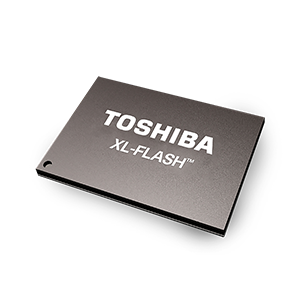Please select your location and preferred language where available.
Toshiba Memory introduces XL-FLASH storage class memory solution
Highest-performing NAND available also cost-effectively reduces latency
- Düsseldorf, Germany, 5 August 2019
Toshiba Memory Europe GmbH (TME) today announced the launch of a new Storage Class Memory (SCM) solution: XL-FLASH. Based on the company's innovative BiCS FLASH 3D flash memory technology with 1bit-per-cell SLC, XL-FLASH brings low latency and high performance to data centre and enterprise storage.
Classified as SCM (or persistent memory), with the ability to retain its contents similar to NAND flash memory, XL-FLASH bridges the performance gap that exists between DRAM and NAND. While volatile memory solutions such as DRAM provide the access speed needed by demanding applications, that performance comes at a high cost.

As the cost-per-bit and scalability of DRAM levels off, this new SCM layer in the memory hierarchy addresses that issue with a high density, cost effective, non-volatile NAND flash memory solution. Poised for growth, industry analyst firm IDC estimates the SCM market will reach in excess of $3B in 2022[1].
Sitting in between DRAM and NAND flash, XL-FLASH brings increased speed, reduced latency and higher storage capacities – at a lower cost than traditional DRAM. XL-FLASH will initially be deployed in an SSD format but could be expanded to memory channel attached devices that sit on the DRAM bus, such as future industry standard non-volatile dual in-line memory modules (NVDIMMs).
Key Features:
- 128 gigabit (Gb) die (in a 2-die, 4-die or 8-die package)
- 4kB page size for more efficient operating system reads and writes
- 16-plane architecture for more efficient parallelism
- Fast page read and program times – XL-FLASH provides a low read latency of less than 5 microseconds, approximately 10 times faster than existing TLC[2]
As the inventor of NAND flash, as well as being the first company to announce 3D flash memory technology and a leader in process migrations, Toshiba Memory is ideally positioned to deliver SLC-based SCM with mature manufacturing, proven scalability and time-tested SLC reliability.
"XL-FLASH is the highest performing NAND available, thanks to our BiCS FLASH – used in SLC mode," noted Axel Stoermann, Vice President, Toshiba Memory Europe GmbH. "By only storing one-bit per cell, we're able to greatly increase performance. And, because XL-FLASH is based on proven technologies that we already mass produce, our customers will be able to accelerate time to market with adoption of XL-FLASH as a Storage Class Memory solution."
Sample shipments will start in September 2019, with mass production expected to begin in 2020.
Notes:
[1] IDC May 2019 - Worldwide Solid State Drive Forecast, 2019-2023, Doc # US43828819
[2] When compared to TMC's TLC NAND which has a read latency of approximately 50 microseconds.
Highest performing NAND available claim based on the fact that the die has been specifically designed (16 planes) to provide higher performance than TLC NAND.
All company names, product names and service names may be trademarks of their respective companies.
In every mention of a Toshiba Memory product: Product density is identified based on the density of memory chip(s) within the Product, not the amount of memory capacity available for data storage by the end user. Consumer-usable capacity will be less due to overhead data areas, formatting, bad blocks, and other constraints, and may also vary based on the host device and application. For details, please refer to applicable product specifications. The definition of 1Gb = 230 bits = 1,073,741,824 bits. The definition of 1GB = 230 bytes = 1,073,741,824 bytes. The definition of 1KB = 210 bytes = 1,024 bytes.
###
About Toshiba Memory Europe GmbH
We, Toshiba Memory Europe GmbH, are the European business of Toshiba Memory Corporation. Our company offers a broad product line of flash memory products, including SD Cards, USB flash drives, and embedded memory components, in addition to solid state drives (SSD). Our company maintains offices in Germany, France, Spain, Sweden and the United Kingdom. President is Masaru Takeuchi.